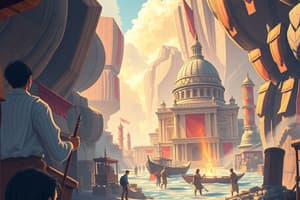Podcast
Questions and Answers
What does the modern definition of economy combine?
What does the modern definition of economy combine?
- Supply and demand
- National income and resources
- Welfare and scarcity (correct)
- Scarcity and distribution
According to Paul.A.Samuelson’s (1948) definition, what is the study of economy focused on?
According to Paul.A.Samuelson’s (1948) definition, what is the study of economy focused on?
- How people and society make choices to utilize scarce resources (correct)
- How to distribute goods and services
- Analyzing macroeconomic concepts
- National income and resources
Which statement accurately describes scarcity?
Which statement accurately describes scarcity?
- Scarcity means a small amount of something is available
- Scarcity results from abundance of resources
- In the context of economics, scarce things must be limited and wanted (correct)
- Scarcity implies an unlimited availability of resources
What is the role of governments in addressing scarcity?
What is the role of governments in addressing scarcity?
In economics, what are goods and services, respectively?
In economics, what are goods and services, respectively?
What economic assumptions contribute to the problem of scarcity?
What economic assumptions contribute to the problem of scarcity?
What characterizes Lionel Robbin’s definition of Economy?
What characterizes Lionel Robbin’s definition of Economy?
According to Alfred Marshall and Lionel Robbin's definitions, which aspect is a significant factor in the study of economy?
According to Alfred Marshall and Lionel Robbin's definitions, which aspect is a significant factor in the study of economy?
Which concept is NOT examined by Lionel Robbin's definition of Economy?
Which concept is NOT examined by Lionel Robbin's definition of Economy?
In what way does Lionel Robbin's definition differ from Alfred Marshall's definition?
In what way does Lionel Robbin's definition differ from Alfred Marshall's definition?
What is a significant concept that Lionel Robbin's definition emphasizes in the study of economy?
What is a significant concept that Lionel Robbin's definition emphasizes in the study of economy?
Which topic is left out of Lionel Robbin's definition of Economy, making it a limitation according to the text?
Which topic is left out of Lionel Robbin's definition of Economy, making it a limitation according to the text?
What does Maslow's theory of needs state about the satisfaction of needs in different categories?
What does Maslow's theory of needs state about the satisfaction of needs in different categories?
Which aspect is a limitation of Adam Smith's definition of economy?
Which aspect is a limitation of Adam Smith's definition of economy?
What is the main drawback of overemphasizing the material aspects of well-being in economic theory?
What is the main drawback of overemphasizing the material aspects of well-being in economic theory?
What is the central objective of studying Adam Smith's definition of the economy?
What is the central objective of studying Adam Smith's definition of the economy?
Which significant concept is absent in Adam Smith's definition of economy?
Which significant concept is absent in Adam Smith's definition of economy?
Study Notes
Definitions of Economy
- Paul A. Samuelson's (1948) definition: Economy is the study of how people and society choose to employ scarce productive resources to produce various commodities over time and distribute them for consumption now and in the future among various persons and groups of society.
Scarcity
- Scarcity does not mean that only a little of something is available, but rather that the resource is limited and wanted.
- Goods are tangible things that satisfy our wants, while services are intangible things that satisfy our wants.
- Economic assumptions: • Humans have unlimited wants. • Goods and services are scarce. • As a result of unlimited wants, scarcity can't be eliminated, but it can be reduced by making the right choices.
Alfred Marshall's (1890) Definition
- Marshall's definition is known as the Welfare Definition.
- It includes the study of man in the ordinary business of life, examining how a person gets his income and how he invests it.
- Welfare is the social effort to promote the basic physical and material wellbeing of people in need.
- Limitations of this definition: • It ignores the problem of scarce resources with unlimited potential uses. • It analyzes the material aspects of human welfare and ignores non-material aspects. • It does not provide a clear link between the acquisition of wealth and welfare.
Lionel Robbins' (1932) Definition
- Robbins' definition is known as the Scarcity Definition.
- It studies human behavior as a relationship between ends and scarce means with alternative uses.
- Scarcity states that the society has insufficient resources to fulfill all human wants and needs.
- This definition requires the efficient use of resources for optimization.
Maslow's Hierarchy of Needs
- Maslow's hierarchy indicates that individuals must satisfy lower-order needs before they can satisfy higher-order needs.
- Lower-order needs include physiological and safety needs, while higher-order needs include social, esteem, and self-actualization needs.
- Maslow's theory allows us to see different levels of economy in a specific order.
Adam Smith's (1776) Definition
- Smith's definition is known as the Wealth Definition.
- It deals with the production, distribution, and consumption of wealth.
- Wealth is the stock of goods existing at a given time that have a money value.
- Limitations of this definition: • It ignores all non-wealth aspects of human existence. • It over-emphasizes the material aspects of well-being and ignores non-material aspects. • It assumes that human beings act as rational economic agents who mindlessly strive to maximize their own well-being.
Studying That Suits You
Use AI to generate personalized quizzes and flashcards to suit your learning preferences.
Description
Explore the economic principles introduced by Paul.A.Samuelson in 1948, focusing on the study of individual actions using mathematical models. Learn about the definition of growth and how scarce resources are allocated to produce commodities for both present and future consumption.




